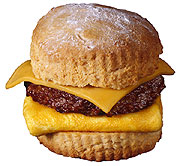
MONDAY, Oct. 22 (HealthDay News) — Stress in parents may contribute to obesity in their kids, and as parental stress rises the kids are more likely to eat fast food, a new study finds.
The research has caveats. It doesn’t definitively prove that kids put on more pounds when they live with stressed-out adults. And, oddly, the study found that kids of stressed parents didn’t eat less produce — although this may have something to do with french fries counting as a vegetable, the authors noted.
Still, the findings suggest that stress changes the way parents act in regard to their children, said study author Dr. Elizabeth Prout Parks, a physician nutrition specialist at The Children’s Hospital of Philadelphia. “Parents need to have support from many levels. There need to be supportive public health programs to help parents problem solve and cope with stress.”
The study authors reached their conclusions after examining responses from a 2006 telephone survey of Philadelphia-area households. The researchers focused on more than 2,100 households with kids aged 3 to 17; in those, 25 percent of the kids were obese.
The kids of parents who reported more types of stresses in their lives — such as health problems, financial strain, unemployment, single parenthood and poverty — were more likely to be overweight. The average number of types of stresses was 1.4.
The study design didn’t allow the researchers to pinpoint how much the risk of obesity goes up for the kids of stressed-out parents. The researchers found that kids ate more fast food if they had parents who perceived themselves as being more stressed on a scale of one to 10. The average stress score was 5.8.
It’s not clear, though, how much more fast food those kids ate.
How might stress in parents affect the weight of kids? “I believe that time is a factor. There’s a lot of ways that stress affects you that would keep you from cooking and having the energy to do some things,” Prout Parks said. “Everyone tries to be the best parents they can be, but when they’re under stress, they aren’t always making the healthier choices.”
The survey was taken in 2006, she said, and it’s “highly likely” that financial stress — like that from the recession — would make things worse now in terms of parental stress and childhood obesity.
Dr. David Ludwig, director of the New Balance Foundation, Obesity Prevention Center, at Boston Children’s Hospital, said stressed parents might resort to fast food and junk fare because they’re pressed for time. “They also may not have the time or the emotional resources to supervise physical activity, and the child might end up watching more television,” he said.
He added: “The question is very interesting and important, especially as our lives are becoming that much more busy and stressful.”
Ludwig acknowledged, however, that things could work the other way around, with obesity in kids resulting in more stress in parents. And it’s possible that some other factor could explain both the parental stress and the excess weight in kids, he said.
Why does the research matter? He said: “If stress can be shown to be a major risk factor for childhood obesity, then it opens up an innovative new approach to prevention — not just focusing on encouraging kids to eat right and be more active, but developing methods to help the children and the parents feel less stressed.”
The study appears online Oct. 22 and in the November issue of Pediatrics.
More information
For more about childhood obesity, try the U.S. National Library of Medicine.

